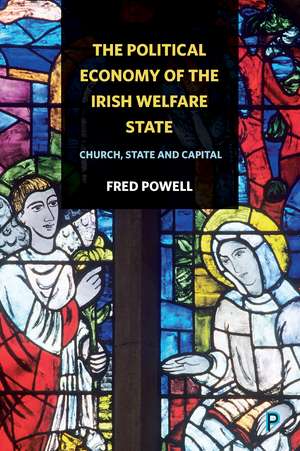The Political Economy of the Irish Welfare State: Church, State and Capital
Autor Fred Powellen Limba Engleză Hardback – 12 sep 2017
This book analyzes the changing shape of Irish society over the hundred years since the 1916 rising, arguing that there are distinctive master patterns that characterize its development of a welfare state that triangulates among church, state, and capital. Fred Powell charts the influence of social movements that resisted oppressive power structures, including the labor and feminist movements, organizations working for the rights of tenants and the homeless, survivors of institutional abuse, groups of asylum seekers and refugees, and activists for gay rights and minority and ethnic cultural rights. The tension between these groups and the more conservative institutions that have dominated Ireland raises major questions about whether an inclusive welfare state is possible in a quasi-religious society.
Preț: 884.45 lei
Preț vechi: 1148.64 lei
-23% Nou
Puncte Express: 1327
Preț estimativ în valută:
169.23€ • 177.17$ • 140.03£
169.23€ • 177.17$ • 140.03£
Carte tipărită la comandă
Livrare economică 07-21 aprilie
Preluare comenzi: 021 569.72.76
Specificații
ISBN-13: 9781447332916
ISBN-10: 1447332911
Pagini: 304
Dimensiuni: 152 x 229 x 23 mm
Greutate: 0.52 kg
Editura: Bristol University Press
Colecția Policy Press
ISBN-10: 1447332911
Pagini: 304
Dimensiuni: 152 x 229 x 23 mm
Greutate: 0.52 kg
Editura: Bristol University Press
Colecția Policy Press
Notă biografică
Fred Powell is professor of social policy and dean of social science at University College Cork, National University of Ireland.
Recenzii
"Powell's erudite but compulsively readable analysis of why Ireland has never managed to create a fully developed welfare state is essential reading for anyone who wants to understand why the country is as it is and what it needs to do if a just and caring society is to be more than an aspiration."
“From this beautifully written book I have finally come to understand how the Irish welfare state model’s unique blend of residualism, familialism, and subordination to the market economy evolved. Powell provides us with an impressive and extraordinarily rich historical reconstruction of how conservative Catholicism and nationalism underpin the peculiar features of Irish social policy.”
"The Political Economy of the Irish Welfare State is at once a coherent and provocative examination of the role of social policy in shaping modern Ireland, a comparative analysis of Irish modernization, and a vital contribution to Irish social history. It combines both breadth of analysis and lucid focus. Powell’s landmark book should be required reading for students of modern Irish history, Irish society, and Irish institutions."
"This is a forthrightly critical, wide-ranging, and engaging study. It conveys with skill and panache the particular, unique development of the welfare state in Ireland, shaped by conservative Catholic culture and power, as well as progressive social movements, particularly the women’s movement. This is contextualized throughout by reference to social policy regime analysis and modernization, laced with a keen sense of social justice opposed to undemocratic corporate power, neoliberalism, and patriarchy."
“Powell outlines the failure over one hundred years of politics and institutions in Ireland to deliver a universalist Welfare State based on social obligation, common citizenship, and human rights. The book lays bare the consequences of this failure for the citizens of Ireland. Students of contemporary Irish social policy seeking to understand the enduring unacceptable levels of poverty, housing deprivation, and an inequitable two-tier health care system will find provocative answers in this engaging book.”
“This book is highly accessible for an international readership, not only of people interested in Ireland, but also for those who want to gain a better understanding of welfare state developments as outcomes of the interaction of social forces, religious and political beliefs, institutional interests, and capitalist offers you can hardly refuse.”
"This is one of those rare books that can step back from the flow of history, identifying the continuities behind seemingly sweeping changes. Thus, it is far more than a history of the Irish welfare state as it places this embodiment of a just society in the wider context of the forces shaping Irish society and the grossly unjust and unequal outcomes. It is essential reading for anyone interested in understanding how, over the last century, Ireland has become what it is. Perhaps more importantly, it sets out the immensely challenging agenda facing those who seek to lay the foundations of a society that has the will and the ability to work for, and cherish well, all its citizens."
"Powell has written a book which captures the complex narrative of the Irish Welfare State. In a clearly written and engaging account of welfare politics and policy, he documents how the progressive instincts of democrats, socialists, and feminists were overwhelmed from the establishment of independent Ireland in the early 1920s by an alliance of state, church, and property interests. This has given rise to a society where the welfare of the people and the values of social justice are secondary to the priorities of institutions, economy, and local and global vested interests."
